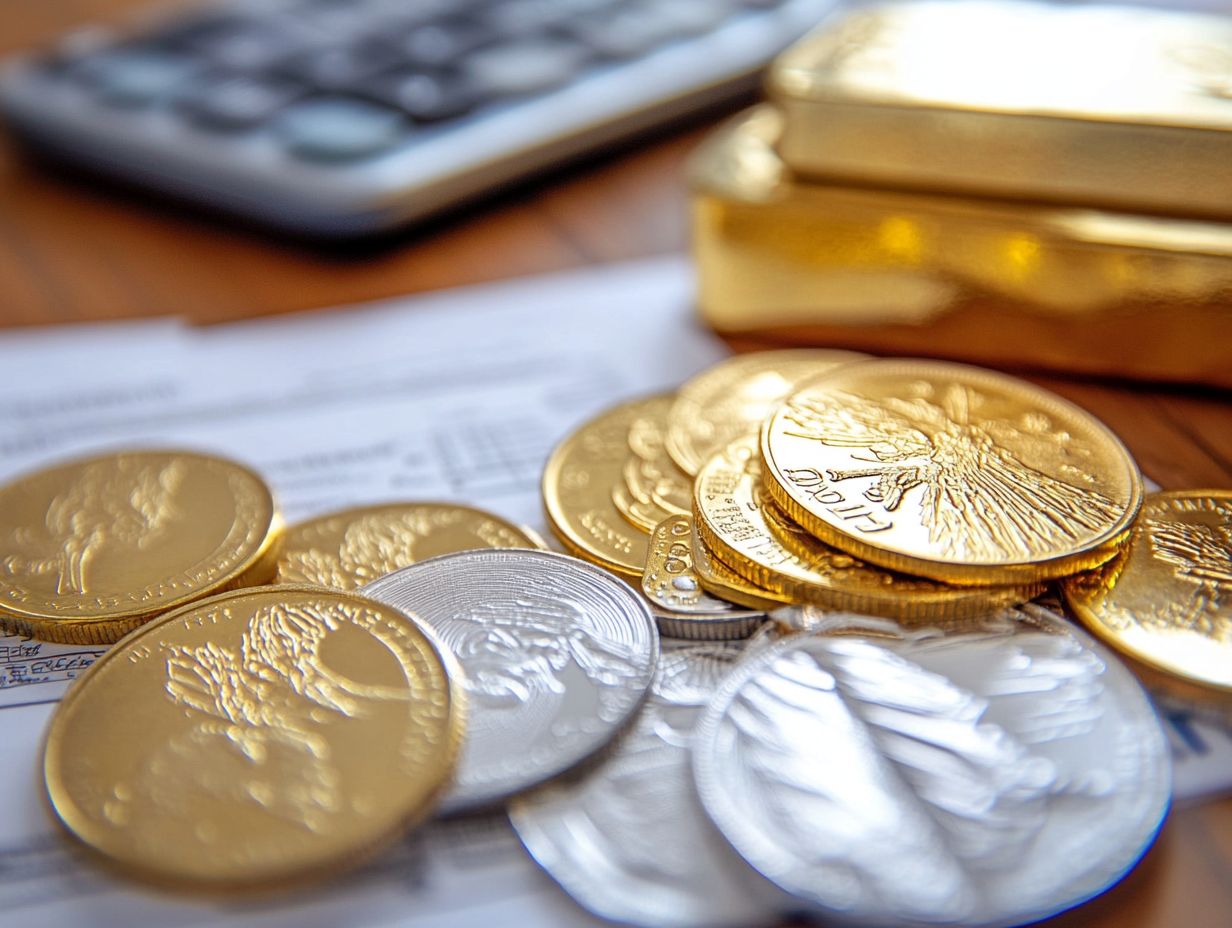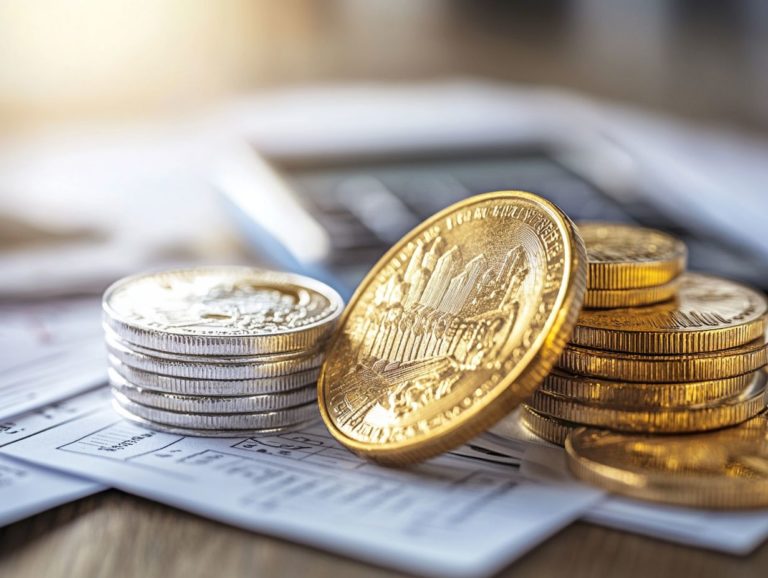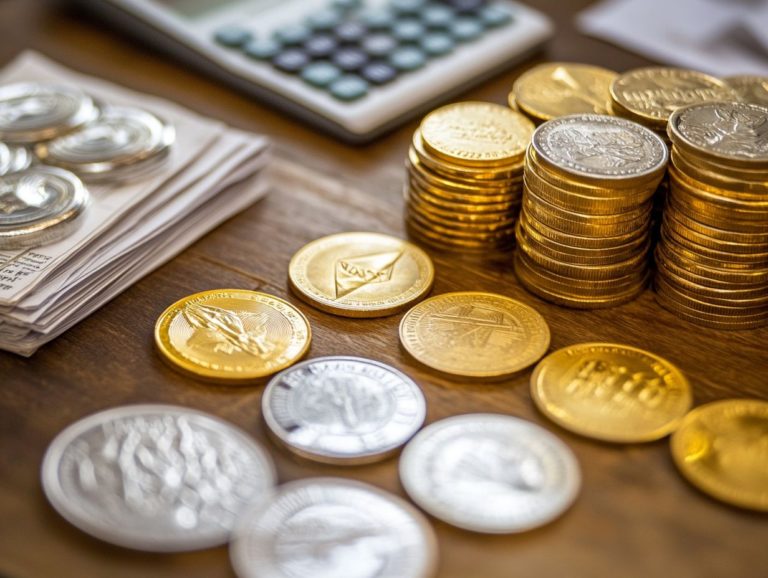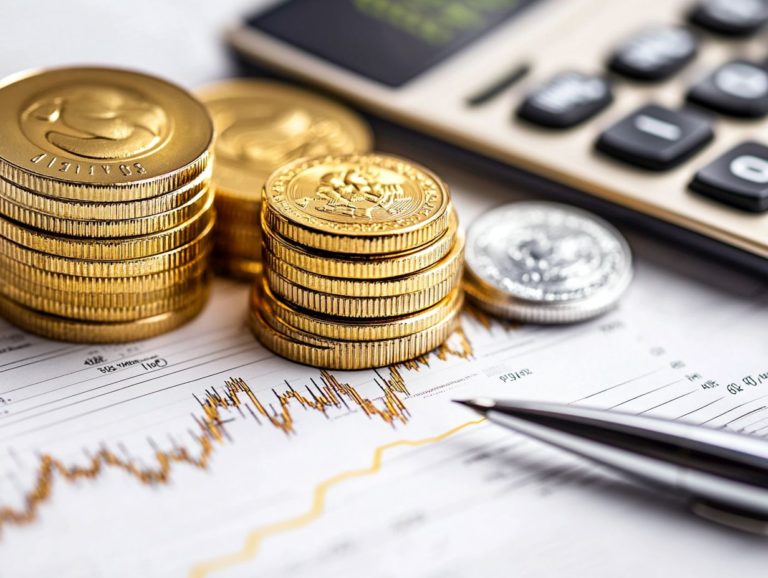The Tax Consequences of Buying Precious Metals Abroad
Investing in precious metals is not just smart; it offers security and a fantastic potential for financial growth. Get ready to explore the world of gold, silver, and other precious metals!
This article delves into the different types of precious metals available, highlighting their investment advantages and the unique features of acquiring them overseas.
When purchasing internationally, it s crucial to be aware of the tax implications that can affect you as an investor. From capital gains to reporting obligations, understanding these elements is essential for navigating this intricate landscape.
Contents
- Key Takeaways:
- Understanding Precious Metals
- Buying Precious Metals Abroad
- Tax Consequences of Buying Precious Metals Abroad
- Strategies for Minimizing Tax Impact
- Frequently Asked Questions
- What are the tax consequences of buying precious metals abroad?
- Are there any taxes I need to be aware of when buying precious metals abroad?
- Do I have to pay taxes on the precious metals I purchase from another country?
- Can I claim taxes paid on precious metals purchased abroad as a deduction?
- Do I need to declare the precious metals I purchase abroad to my home country’s tax authorities?
- Are there any tax benefits to buying precious metals abroad?
Key Takeaways:
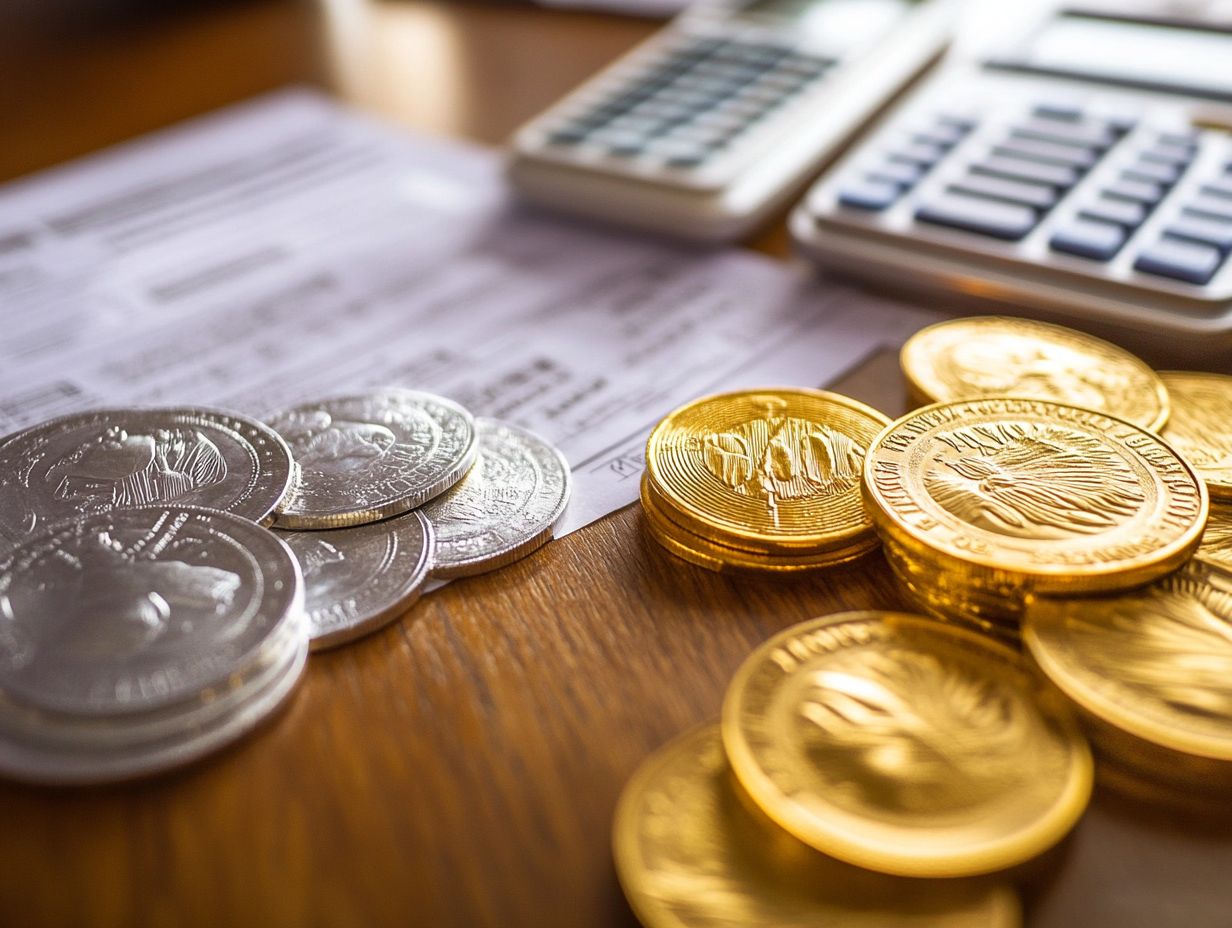
- Investing in precious metals can be a smart way to diversify your portfolio and protect against inflation.
- Buying precious metals abroad may come with tax implications, including potential capital gains and income taxes.
- To minimize tax impact, seek professional advice and consider legal strategies like holding the metals in a tax-advantaged account.
Understanding Precious Metals
Grasping the intricacies of precious metals is vital for investors aiming to enhance their portfolios with tangible assets like gold, silver, and platinum. These commodities provide a physical presence in your investments and act as a safeguard against inflation and economic volatility.
Many financial advisors advocate for integrating precious metals into investment strategies due to their enduring stability and potential for value appreciation. The allure of gold, especially in the form of bullion coins like the American Gold Eagle and Canadian Gold Maple Leaf, lies in their intrinsic worth and strong market demand, appealing to both novice investors and seasoned veterans.
Types of Precious Metals
Precious metals can be classified into various categories, such as gold, silver, platinum, and palladium, each presenting unique investment opportunities and characteristics. These metals shine not only for their aesthetic appeal but also for their remarkable physical properties, including conductivity and resistance to corrosion.
Gold s enduring value, often bolstered by geopolitical stability, makes it a favored choice for bullion coins and exchange-traded funds (ETFs), serving as a shield against inflation. Silver, with its dual identity as a commodity and an investment, is particularly sought after for applications in electronics and solar panels.
Meanwhile, platinum and palladium draw interest for their catalytic properties and growing demand in the automotive industry. As you contemplate your investment portfolio, understanding trading mechanisms like spot prices and futures markets adds to their allure, offering diverse pathways for asset diversification.
Benefits of Investing in Precious Metals
Investing in precious metals unlocks incredible advantages, serving as a hedge against inflation and providing stability during economic uncertainty. Financial advisors frequently recommend including physical assets in your investment portfolio, acknowledging their remarkable ability to retain value over the long term.
These metals also act as a buffer against the unpredictable nature of financial markets. By dedicating a portion of your portfolio to assets like gold and silver, you can effectively mitigate risks arising from inflation and economic downturns. This strategic allocation enhances diversification and ensures you hold tangible wealth that is easily accessible when needed.
The resilience of precious metals during market fluctuations underscores their importance, making them a critical component of any comprehensive financial strategy aimed at fostering long-term stability and prosperity.
Buying Precious Metals Abroad
Acquiring precious metals internationally presents a remarkable opportunity for you as an investor looking to enrich your portfolio. You can explore diverse gold markets, each characterized by its own pricing structures and availability.
Venturing into the realm of international investments in precious metals enables you to diversify beyond domestic options. This can help you uncover better prices and unique products that may not be accessible locally.
However, this strategy requires careful consideration of various factors. Important aspects include legal requirements and tax implications, which can differ significantly from one country to another.
Collaborating with a seasoned financial advisor can provide you with invaluable insights into international purchasing strategies and the intricacies of market dynamics.
Reasons for Purchasing Abroad
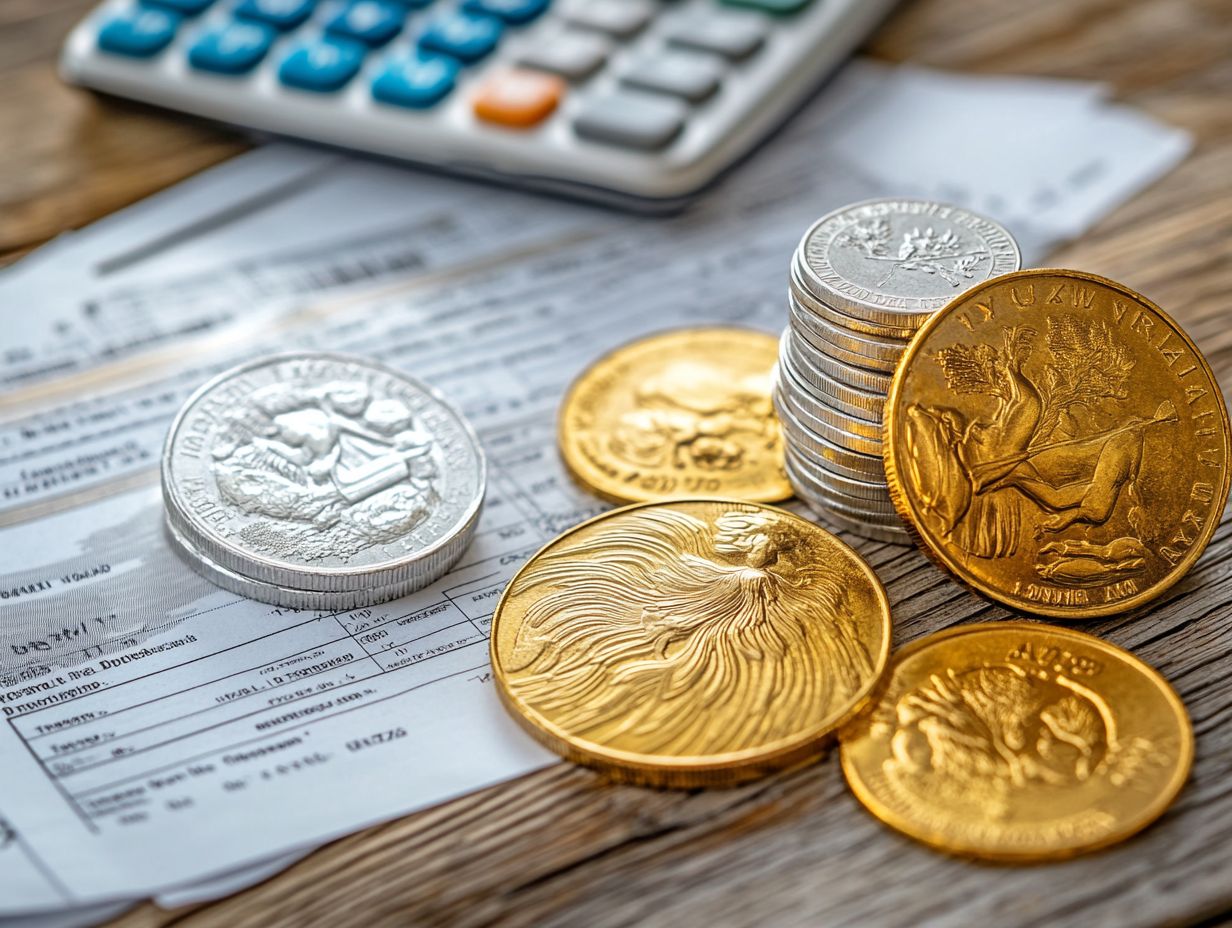
There are several compelling reasons for you to consider purchasing precious metals abroad. These include potential cost advantages, access to unique investment opportunities, and the ability to navigate market fluctuations more effectively.
You might find that international markets often feature lower premiums on gold and silver, allowing you to maximize your returns. The dynamics of global markets can create favorable pricing conditions, particularly in regions where demand differs significantly from what you see domestically.
By exploring international dealers, you can uncover an exciting array of products. This includes rare coins and collectibles that may not be readily available in your local market.
This diversified approach not only enhances your portfolio but also opens up avenues for potential capital appreciation. Investing in precious metals on a global scale can offer you a robust strategy to strengthen your financial security.
Potential Tax Implications
Understanding the potential tax implications of purchasing precious metals abroad is essential for you as an investor. This knowledge will help you optimize your tax planning strategies.
The IRS has specific capital gains and income taxes on the sale of precious metals. These taxes can vary based on your holding period and the type of asset you’ve acquired.
When you make international purchases, you might encounter complexities related to reporting and compliance requirements. This includes the need to file IRS Form 8621, which is a tax reporting form for certain investments.
Ignoring these regulations could lead to increased tax liability, underscoring the importance of thorough tax planning. If you’re considering such transactions, it’s vital to recognize that any gains from the sale of these metals could fall under significant capital gains taxation.
This can significantly impact your overall returns. The distinction between short-term and long-term holdings directly influences the tax rates you’ll encounter, often making long-term strategies the more advantageous choice.
Any income from precious metals, like interest or dividends, is also subject to IRS reporting. Therefore, accurate reporting is essential for maintaining compliance.
Navigating these complex obligations is crucial for effectively managing your portfolio and avoiding potential penalties. This emphasizes the need for diligent record-keeping and professional guidance in your financial endeavors.
Tax Consequences of Buying Precious Metals Abroad
The tax implications of purchasing precious metals overseas will significantly impact your returns. Therefore, it’s crucial to evaluate capital gains and income taxes carefully.
You ll need to navigate the intricate web of IRS regulations and grasp how international acquisitions can alter your tax liability. Keep in mind that long-term and short-term capital gains tax rates differ.
Discerning whether a transaction qualifies as ordinary income is vital for effective tax planning. Accurate reporting is crucial to avoid penalties and ensure adherence to federal tax laws.
It’s wise to seek the counsel of a financial advisor for tailored tax guidance. Act now to seize these unique opportunities!
Capital Gains and Income Taxes
Be aware of the capital gains and income taxes involved in your precious metals transactions. These can significantly impact your net returns.
The IRS, or Internal Revenue Service, draws a clear line between long-term and short-term capital gains based on how long you’ve held the asset. Long-term gains generally enjoy more favorable tax rates 0%, 15%, or 20% while short-term gains are treated as ordinary income.
Grasping these tax rates is crucial if you’re buying and selling precious metals. If you hold your precious metals for over a year, you stand to gain substantial tax benefits. This can unlock lower rates that enhance your overall returns.
On the flip side, if you’re making quicker trades, your profits could be taxed at rates similar to your regular income, which can hit as high as 37% for those in the upper echelon of earners.
You must consider the tax implications now! For instance, selling gold coins shortly after acquiring them might lead to a hefty tax burden. However, holding these assets longer can mitigate some of those taxes, ultimately improving your net gains.
Reporting Requirements
Navigating the reporting requirements for precious metals transactions, especially those conducted abroad, is crucial for maintaining compliance with IRS regulations. You may need to file specific forms, such as IRS Form 8621 for certain foreign investments.
Failing to report can result in penalties, so stay on top of your tax obligations! Keeping detailed records of purchase invoices, receipts, and transactions involving foreign exchanges is vital.
These practices not only simplify your filing process but also provide a transparent transaction history, invaluable during an IRS audit.
Stay informed about the Foreign Account Tax Compliance Act (FATCA), as it may require additional reporting if you are dealing with foreign banks. By maintaining accurate tax records, you can shield yourself from potential repercussions and ensure that your precious metals investments remain secure and rewarding, particularly understanding the tax consequences of trading precious metals.
Strategies for Minimizing Tax Impact
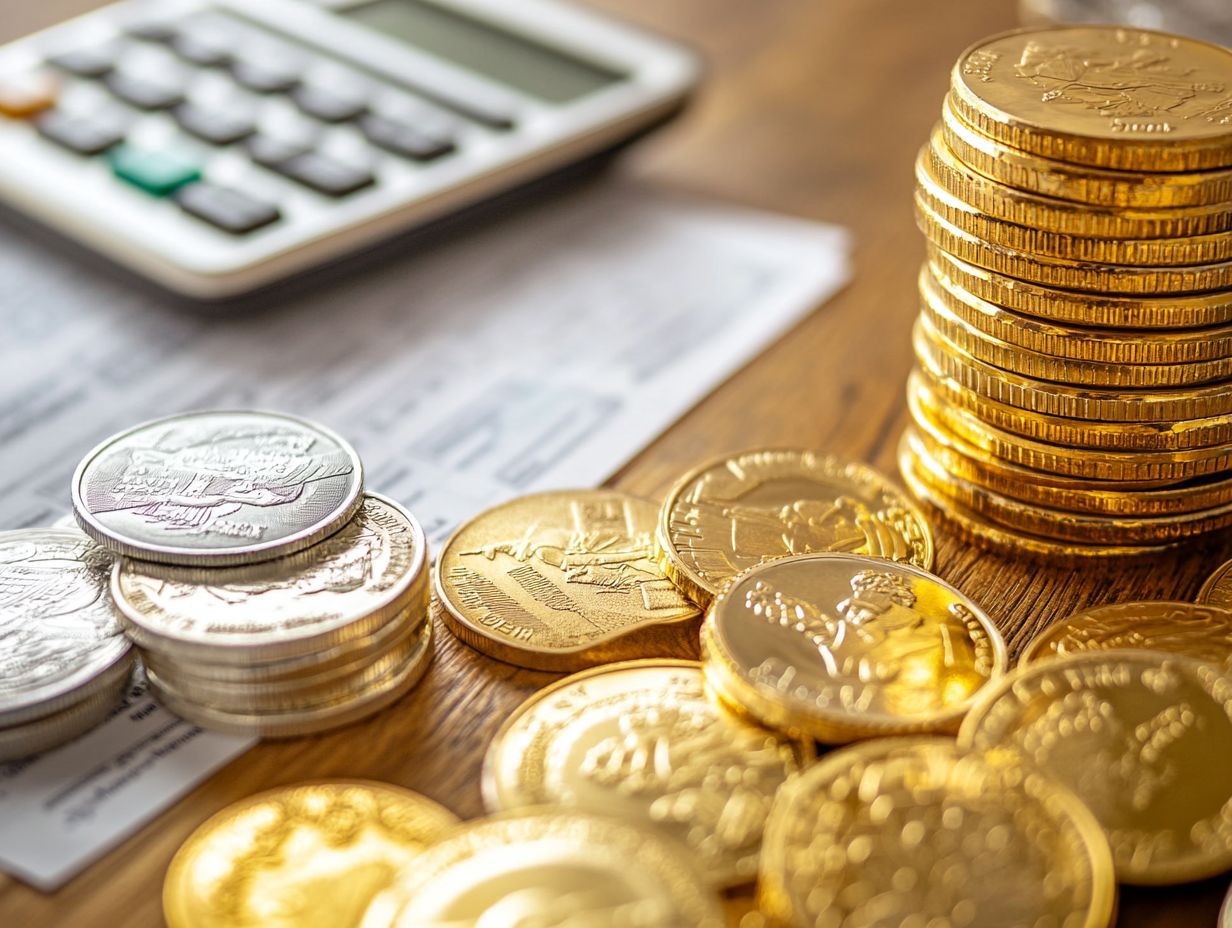
Wondering how to keep more of your profits? Implementing effective strategies to minimize tax impact while investing in precious metals is essential for maximizing your returns.
Your tax planning should delve into the intricacies of capital gains and income taxes while exploring legal avenues to reduce your overall tax burden. Engaging with a knowledgeable financial advisor can provide you with valuable insights into tax-efficient investment strategies.
For instance, consider leveraging retirement accounts or utilizing tax-loss harvesting to offset gains. These approaches can significantly lower your tax liability and enhance your overall financial well-being.
Legal Ways to Reduce Taxes
You have several legitimate avenues to reduce the taxes associated with investing in precious metals, enhancing your returns without running afoul of IRS regulations.
Consider options like Health Savings Accounts (HSAs), which can provide significant tax advantages. Contributions to these accounts are often tax-deductible, and withdrawals for qualified medical expenses are tax-free.
You can also minimize capital gains through strategic planning and thoughtful investment choices, such as holding assets for over a year to benefit from lower long-term capital gains rates.
By effectively applying these strategies, you not only align with IRS guidelines but also optimize your financial outcomes. This ensures that your investments deliver the highest possible returns while reducing your tax liabilities.
Seeking Professional Advice
Seeking professional advice from a financial advisor can unlock invaluable insights into tax planning and investment strategies related to precious metals. An experienced advisor can navigate the complexities of IRS (Internal Revenue Service) rules, helping you understand the tax implications of your transactions.
They assist in identifying the best investment options and ensure your compliance with IRS rules, effectively reducing the risks of audits or penalties. With personalized tax advice, you can discover opportunities to defer taxes or benefit from favorable tax treatments, optimizing your portfolio in the process.
Given the ever-changing landscape of tax laws, having a skilled advisor can truly change the game for you. They provide tailored guidance that aligns with your financial goals and risk tolerance. Working with a financial advisor encourages a strategic approach to building and keeping your wealth, paving the way for long-term stability.
Frequently Asked Questions
-
What are the tax consequences of buying precious metals abroad?
The tax consequences can vary depending on where you purchase and where you are a tax resident. Consult a tax professional to understand potential implications.
-
Are there any taxes I need to be aware of when buying precious metals abroad?
Yes, you may be subject to import taxes, sales taxes, or capital gains taxes when bringing precious metals into your home country. Research these taxes beforehand.
-
Do I have to pay taxes on the precious metals I purchase from another country?
Yes, in most cases, you will owe taxes on precious metals purchased abroad. Some countries may offer tax exemptions for certain types, so research the laws of the country you are buying from.
-
Can I claim taxes paid on precious metals purchased abroad as a deduction?
If you pay taxes on such purchases, you may be able to claim them as a deduction on your tax return. However, this depends on your country’s tax laws, so consulting a tax professional is best.
-
Yes, it is important to declare any precious metals purchased abroad to your tax authorities to avoid penalties or other consequences.
-
Are there any tax benefits to buying precious metals abroad?
Some countries may offer tax benefits like lower import or sales taxes. Research the tax laws of both the purchasing country and your home country to identify potential advantages.
Don’t miss out on valuable insights that could save you money! Consult a financial advisor to explore your options.










